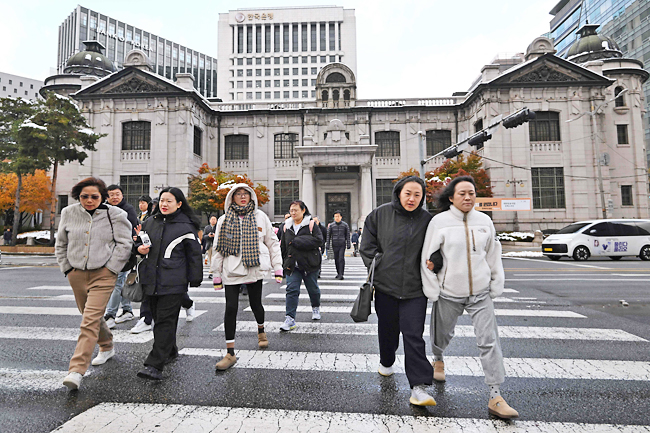ANN/THE KOREA HERALD – South Korea’s consumer prices remained below the central bank’s two per cent target for the third straight month in November, according to data released yesterday.
Consumer prices, a key measure of inflation, rose 1.5 per cent year-on-year in November, following a 1.3 per cent increase in October and a 1.6 per cent rise in September, as reported by Statistics Korea.
Since April, South Korea’s inflation rate has stayed under three per cent, dipping below the two per cent target for the first time in September.
Prices of the overall agricultural, livestock and fisheries products went up one per cent on-year last month, the agency said.
Vegetables, in particular, saw a significant rise of 10.4 per cent compared with the previous year, partly due to unfavourable weather conditions and reduced shipments of key items, such as radishes and cabbages, essential ingredients for kimchi. Meanwhile, fruit prices dropped 8.6 per cent on-year due to stable supply levels.
In contrast, petroleum product prices declined 5.3 per cent from a year earlier in November, driven by easing global oil prices. “The drop is due to the decline in international oil prices compared with the same month last year,” said agency official Baek Ji-seon.
Dubai crude, South Korea’s benchmark, came to USD72.6 per barrel on average last month, reflecting a 13.1 per cent decrease from the same month last year, according to separate data.
On an on-month basis, prices rose 2.4 per cent in November, largely due to the reduction in fuel-tax cuts, the agency said. Core inflation, which excludes volatile food and energy prices, added 1.9 per cent, compared with a 1.8 per cent on-year increase in October, the data showed.
Prices of daily necessities – 144 items closely related to people’s everyday lives, such as food, clothing and housing – climbed 1.6 per cent in November, accelerating from a 1.2 per cent on-year increase in the previous month, the data showed.
“If no significant shocks occur, inflation is expected to remain within the two per cent range,” First Vice Finance Minister Kim Beom-seok said during a meeting with economic officials. He pledged continued government efforts to stabilise prices and support households burdened by the impact of prolonged high inflation.
South Korea has faced significant inflationary pressure in recent years following the COVID-19 pandemic. Consumer prices jumped 5.1 per cent on-year in 2022, marking the highest growth in decades, followed by a slightly lower 3.6 per cent increase in 2023.
The Finance Ministry has said it will alleviate the burden of high energy costs in the winter season by extending its tariff rate quota on energy imports into part of next year.
The tariff rate quota system allows a specified volume of imports to enter the country at reduced tariff rates for a defined period.
The measure is considered crucial for South Korea, which relies heavily on imports for its energy needs.





